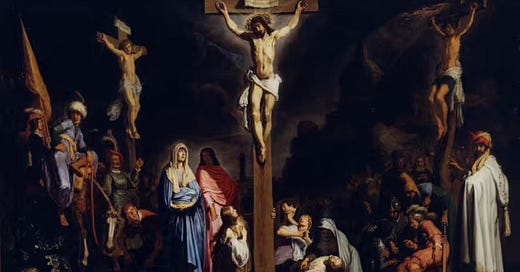Greetings friends, here’s another meditation from St. Thomas Aquinas—this time on the necessity and power of Christ’s death. As before, I’ve left most of Aquinas’ words unedited, simply adding a few brief notes to connect the points. May this help you enter more deeply into the mystery of the Cross this Holy Thursday.
“It is expedient for you that one man should die for the people.” — John 11:50
Aquinas reflects on why it was not only fitting but necessary that Christ should die.
1. Christ’s Death Makes Our Redemption Complete
“Although any suffering of Christ had an infinite value, because of its union with His divinity, it was not by no matter which of His sufferings that the redemption of mankind was made complete, but only by His death.”
It was the death of Christ—not merely His pain—that fully accomplished our salvation. The Holy Spirit, speaking through the high priest Caiaphas, had foretold this:
“It is expedient for you that one man shall die for the people” (John 11:50).
Aquinas then quotes St. Augustine:
“Let us stand in wonder, rejoice, be glad, love, praise, and adore—since it is by the death of our Redeemer that we have been called from death to life, from exile to our own land, from mourning to joy.”
2. Christ’s Death Increases Our Faith, Hope, and Charity
Faith
Aquinas references the Psalms:
“I am alone until I pass from this world” (Ps. 140:10),
—that is, alone until He returns to the Father.
Then he quotes the words of Christ:
“Unless the grain of wheat falling into the ground die, itself remaineth alone” (John 12:24).
Christ’s death multiplies the fruit of faith. Through the Cross, He becomes the seed of countless believers.
Hope
St. Paul writes:
“He that spared not even his own Son, but delivered him up for us all—how hath He not also, with Him, given us all things?” (Rom. 8:32)
Aquinas comments:
“God cannot deny us this, for to give us all things is less than to give His own Son to death for us.”
No—read that again. Actually, let me say it a bit more personally: God cannot withhold this from you, because to give you everything is less than what He’s already done—He gave His own Son to death for you.
St. Bernard adds a powerful image:
“Who is not carried away to hope and confidence in prayer when he looks on the crucifix and sees how Our Lord hangs there—the head bent as though to kiss, the arms outstretched in an embrace, the hands pierced to give, the side opened to love, the feet nailed to remain with us.”
He continues with a mystical image from the Song of Songs:
“Come, my dove, in the clefts of the rock” (Cant. 2:14).
“It is in the wounds of Christ the Church builds its nest and waits, for it is in the Passion of Our Lord that she places her hope of salvation. Thereby she trusts to be protected from the craft of the falcon—that is, of the devil.”
Charity
Aquinas quotes Scripture again: “
At noon he burneth the earth” (Ecclus. 43:3)
“That is to say, in the fervour of His Passion, He burns up all mankind with His love.”
And from St. Bernard once more:
“The chalice thou didst drink, O good Jesus, maketh thee lovable above all things.”
This love, Aquinas says:
“Brushes aside all hindrances, calls out in return the whole of our love. It draws out our devotion more gently, builds it up more straightly, guards it more closely, and fires it with greater ardour.”
The Cross is not just a historical fact. It is the fountain of faith, the anchor of hope, and the fire of love. Today, the Good Jesus Christ dies—not in vain, not as a victim of circumstance, but because it was expedient for us.
Let us stand in wonder, rejoice, be glad, love, praise, and adore.
Say it with me: We adore You, O Christ, and we praise You. Because, by Your holy cross, You have redeemed the world.
If these reflections from Aquinas are helping you walk with Christ through Holy Week, let me know in the comments. I’ll continue to post them through Easter Sunday.
Also, please share if you think this would benefit someone:





Beautiful
Thank you! The Angelic Doctor is so clear in his thinking. St. Bernard is simply beautiful. Your words are helpful in getting us to stop and let the words sink in.